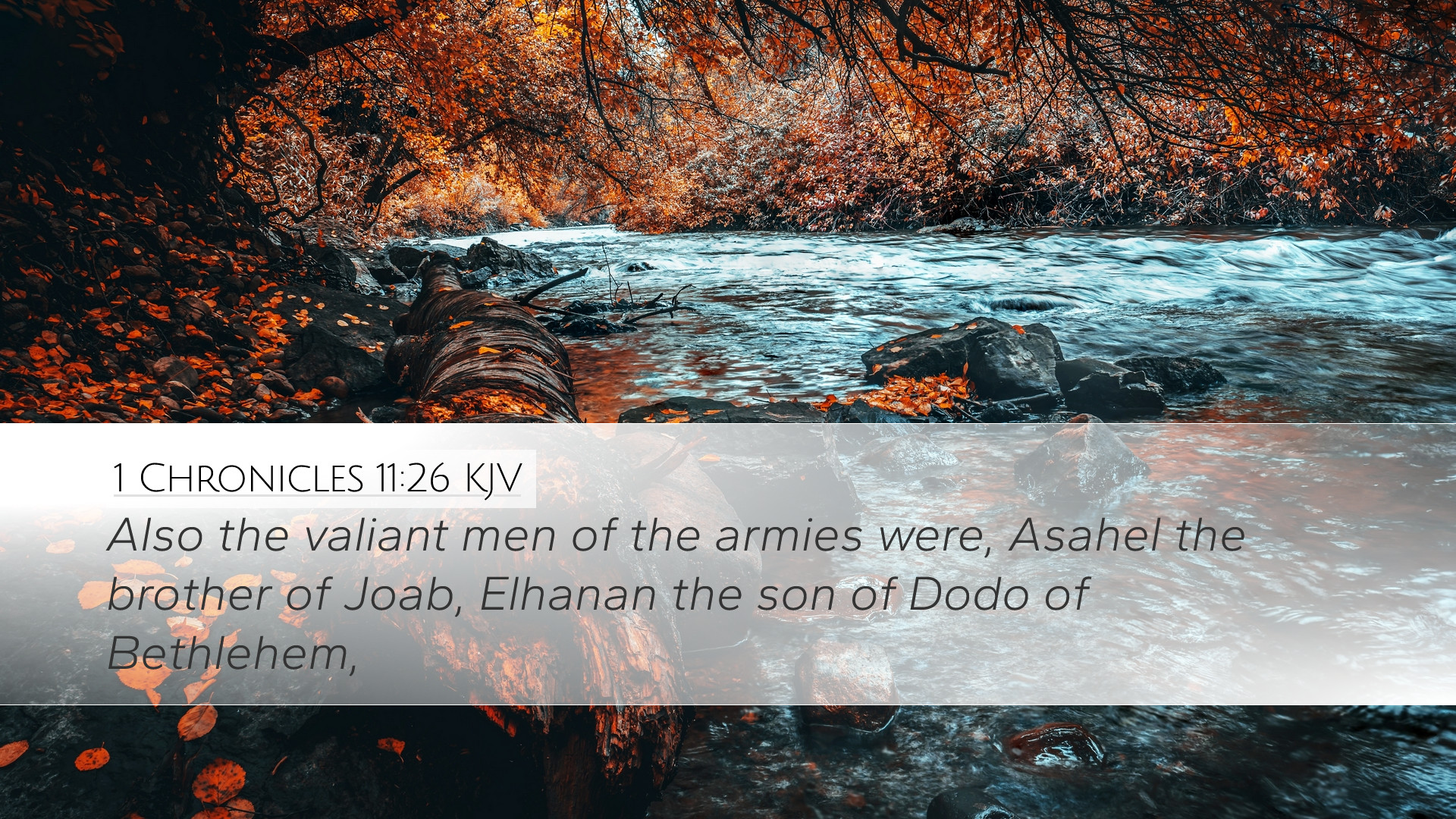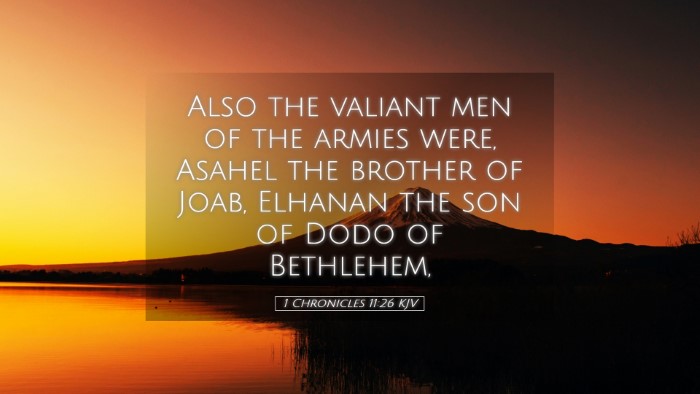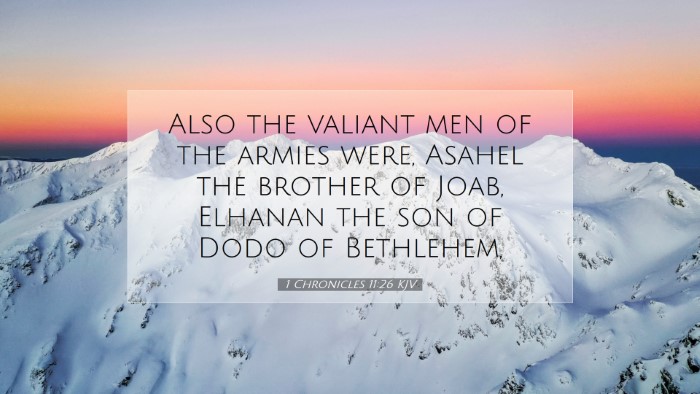Commentary on 1 Chronicles 11:26
1 Chronicles 11:26 reads: "And the mighty men of the armies were, Asahel the brother of Joab, Elhanan the son of Dodo of Bethlehem." This verse provides a glimpse into the mighty men who served under David, marking one of the important elements of his reign. As we delve into the commentaries from Matthew Henry, Albert Barnes, and Adam Clarke, we gain a deeper understanding of the significance of these mighty men and their implications within the narrative of David's kingship.
Contextual Background
The accounts of David's mighty men serve a dual purpose: they illustrate the valor and loyalty of David's supporters, and they demonstrate God's providence in establishing the Davidic line. The list of names not only honors these individuals but also situates David's military successes within a divine framework.
Insights from Commentators
Matthew Henry's Commentary
Matthew Henry emphasizes the importance of the names mentioned in this passage. He notes:
- Asahel and Elhanan: Both are distinguished for their exceptional bravery and service. Asahel is noted for his swiftness, particularly in pursuing enemies, reflecting a dedicated soldier's character.
- Brotherhood and Loyalty: The mention of Asahel as Joab's brother is significant. It emphasizes the familial bonds that often defined military alliances in ancient Israel and suggests a deeper loyalty that would resonate within the ranks of David’s forces.
- Divine Election: Henry points out that these men were chosen not only by David but ultimately by God. Their mighty deeds reflect God's support for David's rule.
Albert Barnes' Commentary
Albert Barnes offers valuable insights into the names listed in this verse:
- Mighty Men as Defenders: Barnes describes these men as critical figures in defending David's throne. Their might and courage are characterized as indispensable to the stability of David's reign.
- The Importance of Leadership: He suggests that Asahel stands out as a notable leader, illustrating the necessity of having effective commanders among the ranks, which is paramount for successful military operations.
- Cultural Context: Barnes reminds readers that the context of warfare and loyalty in ancient Israel underscores the importance of respect for leadership and unity in purpose.
Adam Clarke's Commentary
Adam Clarke provides a thorough analysis of the cultural implications of this verse:
- Historical Significance: Clarke discusses the importance of the mentioning of locations, such as Bethlehem, connecting the identity of David's men to their origins and highlighting the significance of their backgrounds.
- Character Traits: He describes character traits of these men, particularly suggesting that their skills in combat were accompanied by a deep sense of duty and loyalty to David.
- Lessons for Modern Readers: Clarke also draws lessons for contemporary readers, advocating for the recognition of loyalty and courage in the face of adversity, sentiments which resonate well within church teachings today.
Theological Implications
This verse, while brief, encapsulates key theological themes relevant to both ancient and modern audiences. The narrative establishes a framework for understanding loyalty, valor, and divine purpose:
- Divine Providence: The mention of these specific individuals highlights the theme of divine choice in leadership. God equips those He calls, and their service to David reminds us of our own calling to serve and rally around godly leaders.
- The Role of Community: The emphasis on loyalty among David's men underlines the significance of community in the life of the believer. The church is, in many ways, a modern parallel to David’s band of mighty men, where support and
commitment to the cause of Christ are vital.
- Courage in Adversity: The brave exploits of Asahel and Elhanan inspire believers to pursue their own challenges with tenacity and faith, encouraging them to stand firm in their convictions.
Application for Pastors and Theologians
For pastors and theologians, 1 Chronicles 11:26 challenges leaders to foster environments of loyalty and courage within their congregations:
- Encouraging Leadership Development: Just as David's mighty men were developed as leaders, contemporary church leaders are called to cultivate and encourage leadership in their communities.
- Promoting Loyalty and Commitment: Pastors can highlight the dignity of loyalty, encouraging congregants to support one another in the church's mission.
- Building Resilient Communities: The examples of Asahel and Elhanan serve as a reminder of the strength found in community, prompting leaders to work on building a resilient and supportive church environment.
Conclusion
The passage found in 1 Chronicles 11:26, while succinct, offers a wealth of theological and practical insights that can greatly benefit pastors, students, and scholars. By looking back at the might of Asahel and Elhanan, we are encouraged to reflect on our own roles within the larger narrative of faith and community, inspiring us to rise up as committed followers ready to support our leaders and each other in the pursuit of God’s kingdom.


